
Guests
- Robert Redforddirector, actor and activist.
Robert Redford, the legendary Oscar-winning director, actor and activist, died at the age of 89 on Tuesday. Redford was a longtime environmental activist who served for five decades as a trustee of the Natural Resources Defense Council. He was also the creator of the Sundance Film Festival, which he helped grow into one of the largest independent film festivals in the world. Democracy Now! interviewed Redford many times over the years about his career, the importance of independent cinema and his environmental activism.
“I guess you could call me an activist,” Redford said in 2015. “The deniers of climate change are probably people who are afraid of change. They don’t want to see change.”
Transcript
AMY GOODMAN: This is Democracy Now!, democracynow.org. I’m Amy Goodman, with Juan González.
We end today’s show with the late Robert Redford in his own words. The legendary Oscar-winning director, actor and activist died at his home in Sundance, Utah, at the age of 89 Tuesday. In addition to being a Hollywood icon, Robert Redford was a longtime environmental activist who served for 50 years as a trustee of the Natural Resources Defense Council. He was also the creator of the Sundance Film Festival, where I would often interview him over the last decade. This is part of an interview we did in 2015 in Park City.
ROBERT REDFORD: I think the deniers of climate change are probably people who are afraid of change. They don’t want to see change. They want to hang onto — they want to hang onto the way things were. And my feeling about the deniers and a lot of other issues that are out there is that too many — too many in Congress are pushing us back into the 1950s. That’s what it feels like. They’re pushing us back in time, rather than forward in time. And I think — why is the reason? Maybe they’re afraid of not being able to be included. I don’t know what it is. But it’s kind of sad, because it’s so polarized and so mean-spirited.
AMY GOODMAN: They also often say that we need this oil to move forward in America.
ROBERT REDFORD: Well, we also need alternative energy, too. I mean, I think that’s the future. I don’t think oil is the future. I think it should probably stay — and this is going to be an unpopular view, but I think — because I worked on an oil field as a kid. I worked in the Chevron oil fields in California. So I’ve had a lot of experience with oil. I think it should stay in the ground now. And I think that we are so close to polluting the planet beyond anything sustainable. I think we better start — say, let’s stop this argument about alternative energy is not going to produce enough jobs. To me, that’s a mistake, because it would produce an industry, and an industry would produce jobs. So I think somebody’s got to speak up for the fact that alternative energy is the way of the future, not oil, certainly not coal and gas. So that’s my feeling.
AMY GOODMAN: And your thoughts on the oil barons, the Koch brothers? It’s just been announced that they and their allied groups will pour $900 billion [sic] into the next election, doubling what they did in the last election — $900 million into the next election.
ROBERT REDFORD: Money is the name of the game. I mean, I think money is what moves the ball, and they’re moving the ball in their direction. I think it’s the wrong direction. It’s very narrow-minded. But they have the money to do it, so — it’s a free country.
AMY GOODMAN: So, some people might be saying right now, why am I talking to this famous actor, an Oscar-winning director, about issues like the environment and money in politics?
ROBERT REDFORD: Well, because I’ve been an — I guess you could call me an activist, since 1969. I’ve been involved in the environment from the standpoint of wanting to draw attention to what an alternative could be, rather than what we’ve been having. And I remember when I was at a conference in Vail, Colorado, and they talked about where all the energy was going. All the effort and the energy and the money was going to oil, gas, coal, and nothing was being contributed to the alternative energy.
And I thought, why? This stuff is going to run out. It’s not infinite. It’s going to run out. And it’s costly. And it pollutes our planet. If somebody doesn’t start thinking about what we’re going to develop for our survival — because I think we are a development-oriented society — it’s going to be a question of what we develop for our survival and what we preserve for our survival. And I think there’s been little to no talk about preservation, because those people that you’re talking about, the McConnells and people like that, they’re living so far in the past, they’re living so much in the past, seems like they’re afraid of the future.
AMY GOODMAN: Can you believe that the Sundance Film Festival is 31 years old?
ROBERT REDFORD: No.
AMY GOODMAN: Do you think of it as one of your children?
ROBERT REDFORD: You know, it’s interesting. I think of it — because it started — it was a big idea back in 1985. It was a big idea with a small start, because there was no support. There was only one theater in Park City. Sundance, the place, is not here in Park City; it’s 40 miles away, higher up in the mountains, tucked away. It’s where our lab programs are. That’s where the development process is. That’s where our nonprofit, Sundance Development, for the documentaries and the film and the theater and so forth, music. Park City works out for us because they have something we need, which is theatrical distribution capability, and we give them something they need, which is a venue to attract people. So, the first year, there was maybe 150 people that showed up. We had one theater, maybe 10 documentaries and 20 films. And now it’s grown to the point where it’s kind of like a wild horse. I can’t begrudge it. I mean, that was the dream. It started as just a hope. Then, when it became a reality, it started to have its own momentum.
AMY GOODMAN: And the point of it? Since you certainly, you know, have great acclaim in Hollywood, you didn’t need another venue, as all the creative ways you participate in the film industry, as director, as an actor. So why Sundance? You had it made.
ROBERT REDFORD: In 1980, the industry began to be more centralized, and they were following the youth market, because that’s where the money was, which I understand. But it looked like it was going to be at the expense of some of those other films that were more about the humanistic side of cinema, stories about America, American way of life, complex stories. And so, in my mind, I thought that was very valuable. I thought that’s a wonderful use of film. You can have the big blockbusters. You can have — with technology coming along, creating more special effects possibilities, you knew that they were going to use that, and that’s great. But I felt it was going to be at the expense of giving up those other kinds of films, so that’s what led to Sundance.
And I thought, “Well, what if we can start a development process where young artists can have a voice, but we can help them develop their skills so they can at least get their films made?” That was the labs that started in 1980. Then, once that happened and we started a development process at Sundance, suddenly we realized that we were helping them develop their skills so that they could get their films made, but there was nowhere to go, because the mainstream had not allowed any space for them. And that led to the idea of a festival. So, originally, it was just an idea that maybe we can have a community of filmmakers coming together and share each other’s work. And maybe if we were lucky, somebody will come, and somebody else will come.
AMY GOODMAN: The Oscar-winning director, actor and activist Robert Redford, speaking on Democracy Now! in one of a number of interviews we did with him at the Sundance Film Festival in Park City, Utah, that interview in 2015. He died on Tuesday at the age of 89 at his home in Utah. The Sundance Film Festival will be moving after this next year from Park City to Boulder. Robert Redford served for five decades as a trustee of the Natural Resources Defense Council. Manish Bapna, president and CEO at NRDC, said, quote, “The environmental movement has lost a giant. Nobody has done more to shine a light on the most important environmental issues from the dawn of the environmental movement in the ’70s through the biodiversity and climate crises of today.” Again, Robert Redford dead at the age of 89, but his legacy continues. You can go to democracynow.org for all of our interviews. I’m Amy Goodman, with Juan González.

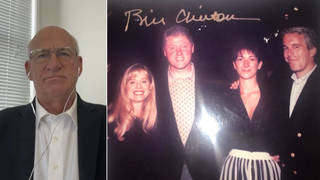
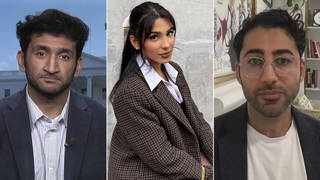
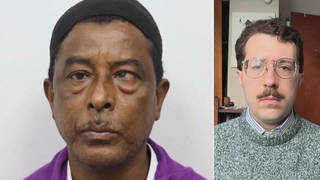
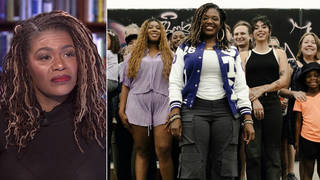





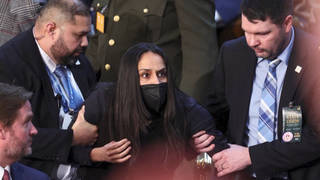
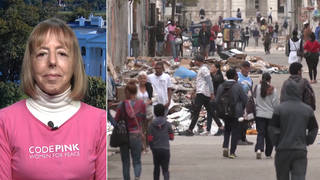
Media Options